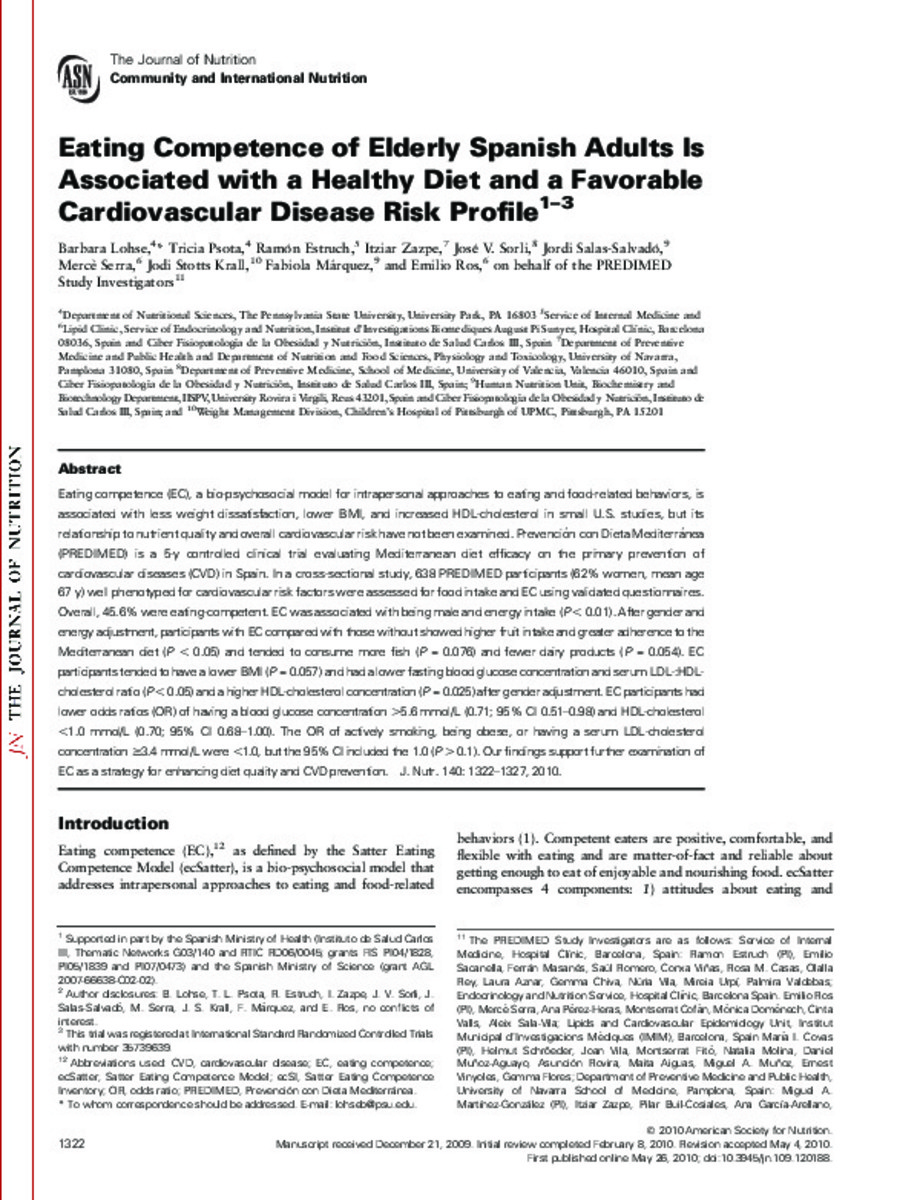Full metadata record
| DC Field | Value | Language |
|---|---|---|
| dc.creator | Lohse, B. (Barbara) | - |
| dc.creator | Psota, T. (Tricia) | - |
| dc.creator | Estruch, R. (Ramón) | - |
| dc.creator | Zazpe, I. (Itziar) | - |
| dc.creator | Sorli, J.V. (Jose V.) | - |
| dc.creator | Salas-Salvado, J. (Jordi) | - |
| dc.creator | Serra-Mir, M. (Merce) | - |
| dc.creator | Krall, J.S. (Jodi Stotts) | - |
| dc.creator | Marquez, F. (Fabiola) | - |
| dc.creator | Ros, E. (Emilio) | - |
| dc.date.accessioned | 2013-04-17T16:47:45Z | - |
| dc.date.available | 2013-04-17T16:47:45Z | - |
| dc.date.issued | 2010 | - |
| dc.identifier.citation | Lohse B, Psota T, Estruch R, Zazpe I, Sorli JV, Salas-Salvado J, et al. Eating Competence of Elderly Spanish Adults Is Associated with a Healthy Diet and a Favorable Cardiovascular Disease Risk Profile. J Nutr 2010 JUL;140(7):1322-1327 | es_ES |
| dc.identifier.issn | 0022-3166 | - |
| dc.identifier.uri | https://hdl.handle.net/10171/28303 | - |
| dc.description.abstract | Eating competence (EC), a bio-psychosocial model for intrapersonal approaches to eating and food-related behaviors, is associated with less weight dissatisfaction, lower BMI, and increased HDL-cholesterol in small U.S. studies, but its relationship to nutrient quality and overall cardiovascular risk have not been examined. Prevención con Dieta Mediterránea (PREDIMED) is a 5-y controlled clinical trial evaluating Mediterranean diet efficacy on the primary prevention of cardiovascular diseases (CVD) in Spain. In a cross-sectional study, 638 PREDIMED participants (62% women, mean age 67 y) well phenotyped for cardiovascular risk factors were assessed for food intake and EC using validated questionnaires. Overall, 45.6% were eating-competent. EC was associated with being male and energy intake (P < 0.01). After gender and energy adjustment, participants with EC compared with those without showed higher fruit intake and greater adherence to the Mediterranean diet (P < 0.05) and tended to consume more fish (P = 0.076) and fewer dairy products (P = 0.054). EC participants tended to have a lower BMI (P = 0.057) and had a lower fasting blood glucose concentration and serum LDL-:HDL-cholesterol ratio (P < 0.05) and a higher HDL-cholesterol concentration (P = 0.025) after gender adjustment. EC participants had lower odds ratios (OR) of having a blood glucose concentration >5.6 mmol/L (0.71; 95% CI 0.51-0.98) and HDL-cholesterol <1.0 mmol/L (0.70; 95% CI 0.68-1.00). The OR of actively smoking, being obese, or having a serum LDL-cholesterol concentration > or =3.4 mmol/L were <1.0, but the 95% CI included the 1.0 (P > 0.1). Our findings support further examination of EC as a strategy for enhancing diet quality and CVD prevention. | es_ES |
| dc.language.iso | eng | es_ES |
| dc.publisher | American Society for Nutrition | es_ES |
| dc.rights | info:eu-repo/semantics/openAccess | es_ES |
| dc.subject | Mediterranean diet | es_ES |
| dc.subject | Metabolic system | es_ES |
| dc.subject | Cholesterol | es_ES |
| dc.subject | Randomized trial | es_ES |
| dc.subject | PREDIMED study | es_ES |
| dc.title | Eating competence of elderly Spanish adults is associated with a healthy diet and a favorable cardiovascular disease risk profile | es_ES |
| dc.type | info:eu-repo/semantics/article | es_ES |
| dc.type.driver | info:eu-repo/semantics/article | es_ES |
| dc.identifier.doi | http://dx.doi.org/10.3945/jn.109.120188 | es_ES |
Files in This Item:
Statistics and impact
Items in Dadun are protected by copyright, with all rights reserved, unless otherwise indicated.






